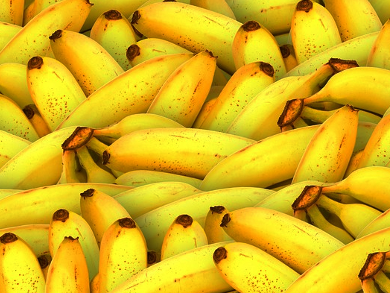Haya Friedman, Agricultural Research Organization, Bet Dagan, Israel, and colleagues have developed transgenic bananas with longer shelf-life by reducing expression of two transcription factors.
Previous studies showed that shelf-life of tomatos (Solanum lycopersicum) is controlled by the ripening gene RIN-MADS. The scientists characterized similar genes in bananas (Musa acuminata), the MADS box genes, MaMADS1 and MaMADS2. When the expression of these genes was repressed, the banana plants showed delayed ripening and extended shelf-life characteristics.
The delay in fruit ripening is associated with a delay in climacteric respiration and reduced synthesis of the ripening hormone ethylene. In the lines with highest gene repression, no ethylene was produced and ripening was most delayed. Unlike tomato rin mutants, bananas of all transgenic repression lines responded to exogenous ethylene by ripening normally. This is likely due to incomplete transgene repression and/or compensation by other MADS box genes.
According to the researchers, quality and taste of the transgenic bananas remained the same. The team is currently working on commercializing their results.
- Banana MaMADS Transcription Factors Are Necessary for Fruit Ripening and Molecular Tools to Promote Shelf-Life and Food Security,
Tomer Elitzur, Esther Yakir, Lydia Quansah, Fei Zhangjun, Julia Vrebalov, Eli Khayat, James J. Giovannoni, Haya Friedman,
Plant Physiology 2016, 171(1), 380–391.
DOI: http://dx.doi.org/10.1104/pp.15.01866



